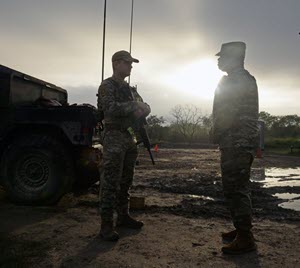Story by Sgt. 1st Class Elizabeth Pena
Texas Military Department
 Photo By Sgt. 1st Class Elizabeth Pena
Photo By Sgt. 1st Class Elizabeth Pena
HARLINGEN, Texas -- Senior Enlisted Advisor Tony L. Whitehead, the senior enlisted advisor for the Chief, National Guard Bureau, visits Texas Guardsmen, November 22-24, 2022, in Harlingen, Texas, to check the pulse of the soldiers and airmen during the Thanksgiving holiday.
SEA Whitehead serves as the Chief's principal military advisor on all enlisted matters affecting training, utilization, the health of the force, and enlisted professional development. As the highest enlisted level of National Guard leadership, he provides direction for the enlisted force and represents their interests.
"The purpose of the visit was to check on our soldiers and airmen working on Operation Lone Star," said SEA Whitehead. "They're Guardsmen, and I wanted to make sure that we had an opportunity to speak to them about their thoughts and ideas about the mission, how they were doing, how they felt about how the mission was going and any ideas that I needed to take back to the Chief of the National Guard Bureau."
Operation Lone Star is a state-led mission to respond to increased illegal immigration on the Texas-Mexico border. In May of 2021, Texas issued a disaster declaration covering 48 counties, primarily counties along or near the Texas – Mexico border. Currently, approximately 6,000 service members are deployed in support of Operation Lone Star.
During the visit, SEA Whitehead met with different units and components to get a full picture of the various mission sets of the state active-duty members, which included getting to ride on a Texas State Guard Center Console boat, used by Task Force East, known as the 'river unit' for the border mission. This unit uses TXSG flat-bottomed and center console boats in support of the border mission.
"Task Force East is responsible for four zones in the McAllen sector of the border. Our unit is specifically responsible for the river," said Texas Army National Guard Capt. Mike Jones, commander of the TF East team. "Today, we were showcasing some of the highlights of both the Mexico and U.S. side such as landmarks, key areas the Cartel uses and Border Patrol use, you know, in the whole cat and mouse game of border security."
Soldiers assigned to the river unit received recognition coins from SEA Whitehead for their outstanding work on the border. They had the opportunity to talk about their experiences on the mission with the highest enlisted leader in the National Guard.
"The Southwest Border Mission is a unique mission to the United States," said SEA Whitehead. "For our soldiers and airmen doing the mission, this has been talked about a lot, and I think sometimes we forget that we've got people down there 24 hours a day, seven days a week."
As part of SEA Whitehead's priority to seek opportunities for innovation and advancement within the ranks, SEA Whitehead asked service members to provide feedback to take back to the top [Pentagon].
"The visit was so great for my soldiers," said Capt. Jones. "These guys [and gals] are all highly motivated, to begin with, but having leadership from NGB come down and see what they do on a day-to-day basis is a big deal."
Some of the unit-level leadership also briefed SEA Whitehead on the morale of the Texas Guardsmen, stating there was an 86 percent volunteer rate for troops wishing to stay on the mission. These extension requests, leaders said, can be attributed to the pay incentives, time off to spend with family and the unique mission set the border mission provides. Through OLS, Texas Guardsmen can work in different units and alongside state partners like the Border Patrol Department of Public Safety, as well as the impact the mission has on the communities.
Reflecting on his visit, SEA Whitehead was incredibly impressed with the service members' work and their commitment to serving the greater good.
"One of the best things I liked about what I heard was that they have been here long enough to see the difference they have made in what they've been doing. So, despite some of the things they've heard regarding the negative social media or negative press, they know that there's been a positive difference in what they have been doing since they've been here."
When asked why he chose to come during a Thanksgiving holiday, SEA Whitehead said he wanted to ensure our soldiers and airmen know military leaders in Washington, D.C., are mindful of their 24/7 commitment.
"When the holidays come around, I don't know if people have the impression that things are halted because of it or that they are just comforted that we have military members down there on the Texas-Mexico border. Some of our Guardsmen have families that they're separated from, that's not just those deployed overseas but those deployed right here in the U.S.," said SEA Whitehead. "So, it's important for the Chief of the National Guard Bureau, myself, and the rest of the leadership team to go down and tell them ‘Thank you’ for what they're doing. We appreciate what they're doing, and we must let them know they're standing in a gap that's extremely important to our nation's security."